Are you wondering why it hurts to pee? In this detailed guide, I will explain the various factors that can lead to painful urination and provide helpful information on how to alleviate discomfort.
Key Takeaways:
- Painful urination, or dysuria, can be caused by factors such as urinary tract infections, sexually transmitted infections, kidney stones, and bladder cancer.
- Other potential causes include urethral strictures, diverticulitis, vaginal inflammation, and radiation therapy.
- Pregnant women may experience painful urination due to hormonal changes and urinary tract infections.
- Seeking medical help is important for proper diagnosis and treatment, which may include antibiotics, pain relief medications, or lifestyle changes.
- Prevention strategies, such as maintaining good hygiene and staying hydrated, can help prevent painful urination.
Causes of Painful Urination
Painful urination can stem from a range of causes, including urinary tract infections (UTIs), bladder infections, and sexually transmitted diseases (STDs). These conditions can lead to inflammation and irritation of the urinary tract, causing discomfort and pain during urination.
Urinary tract infections (UTIs) are one of the most common causes of painful urination. UTIs occur when bacteria enter the urethra and travel up into the bladder or kidneys. The bacteria then multiply, leading to infection and inflammation. Common symptoms of UTIs include a burning sensation while urinating, frequent urge to urinate, cloudy or strong-smelling urine, and lower abdominal pain.
Bladder infections, also known as cystitis, can also cause painful urination. These infections occur when bacteria enter and multiply in the bladder. Symptoms of bladder infections include pain or pressure in the lower abdomen, frequent urination, blood in the urine, and a strong urge to urinate even when the bladder is empty.
Sexually transmitted diseases (STDs) can also result in painful urination. STDs such as chlamydia, gonorrhea, and herpes can cause inflammation and irritation in the genital and urinary tracts, leading to discomfort during urination. It is important to get tested for STDs if you experience painful urination and suspect that you may have been exposed to an infection.
Common Causes of Painful Urination:

| Cause | Symptoms |
|---|---|
| Urinary Tract Infections (UTIs) | Burning sensation, frequent urge to urinate, cloudy or strong-smelling urine, lower abdominal pain |
| Bladder Infections (Cystitis) | Pain or pressure in the lower abdomen, frequent urination, blood in the urine, strong urge to urinate even when the bladder is empty |
| Sexually Transmitted Diseases (STDs) | Inflammation and irritation in the genital and urinary tracts |
If you are experiencing painful urination, it is important to see a healthcare provider for a proper diagnosis and treatment. They can determine the underlying cause of your symptoms and recommend the appropriate course of action. Treatment options for painful urination may include antibiotics to treat infections, antiviral medications for STDs, pain relief medications to alleviate discomfort, hormone therapy for hormonal imbalances, surgery to correct structural issues, or lifestyle changes to prevent future episodes.
Urinary Tract Infections: A Common Culprit
Urinary tract infections (UTIs) are one of the most common causes of painful urination, often accompanied by symptoms like frequent urination, urgency, and a burning sensation. UTIs occur when bacteria enter the urethra and travel up into the urinary system, leading to infection. Women are more prone to UTIs due to their shorter urethra, which makes it easier for bacteria to reach the bladder. However, men can also experience UTIs, especially in cases of underlying medical conditions or urinary catheter use.
“UTIs occur when bacteria enter the urethra and travel up into the urinary system, leading to infection.”
When bacteria proliferate in the urinary tract, they cause irritation and inflammation, resulting in pain. The severity of the pain can vary from mild discomfort to intense burning sensations during urination. It’s important to seek medical attention promptly if you suspect a UTI, as untreated infections can lead to more serious complications, such as kidney infections.
Diagnosis of UTIs typically involves a urine test to detect the presence of bacteria and determine the appropriate course of treatment. Antibiotics are commonly prescribed to clear the infection and alleviate symptoms. It’s crucial to complete the full course of antibiotics as prescribed by a healthcare professional to ensure complete eradication of the infection and prevent recurrence.
| Common Symptoms of UTIs | Possible Treatment Options |
|---|---|
|
|
Prevention is key in reducing the risk of UTIs. Maintaining good hygiene practices such as wiping front to back after using the toilet, staying well-hydrated, and urinating before and after sexual activity can help prevent the entry of bacteria into the urinary tract. Additionally, avoiding irritants like harsh soaps and douching can help maintain a healthy balance of bacteria in the genital area.
Tips for Preventing UTIs:
- Drink plenty of water to flush out bacteria.
- Urinate before and after sexual intercourse.
- Wipe from front to back after using the toilet.
- Avoid using harsh soaps and douching products.
- Wear breathable cotton underwear.
By understanding the causes and taking proactive measures, such as proper hygiene and seeking timely medical care, it becomes possible to effectively manage and prevent urinary tract infections, reducing the occurrence of painful urination.
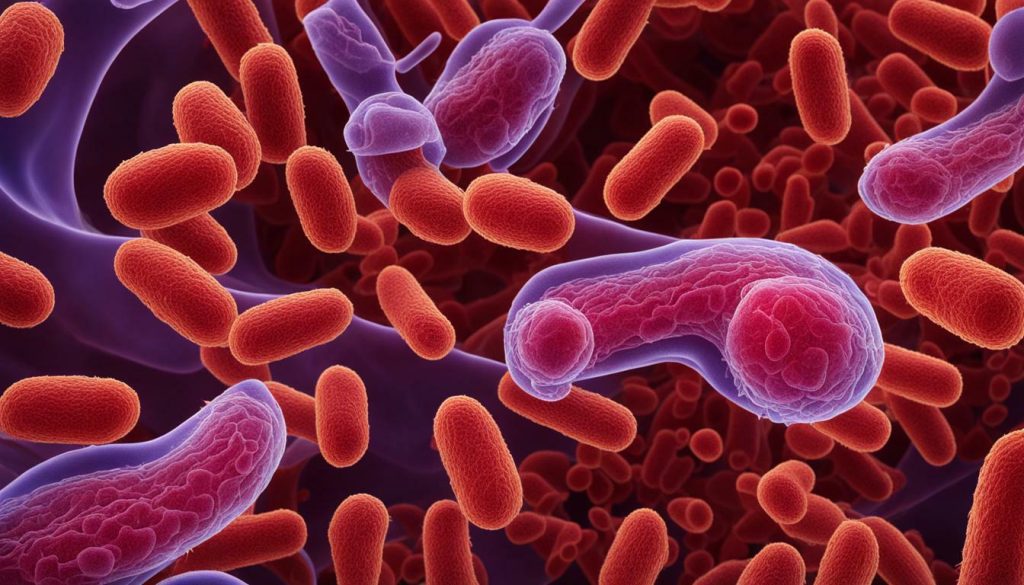
In addition to UTIs, other factors like kidney stones can also result in discomfort and pain when urinating. Understanding these causes is crucial for finding the appropriate treatment.
Kidney stones, also known as renal calculi, are hard deposits that form in the kidneys. They can vary in size and shape, causing blockages in the urinary tract and leading to painful urination. The pain associated with kidney stones is often described as sharp and severe. Along with pain, individuals may experience other symptoms such as blood in the urine, frequent urination, and cloudy or foul-smelling urine.
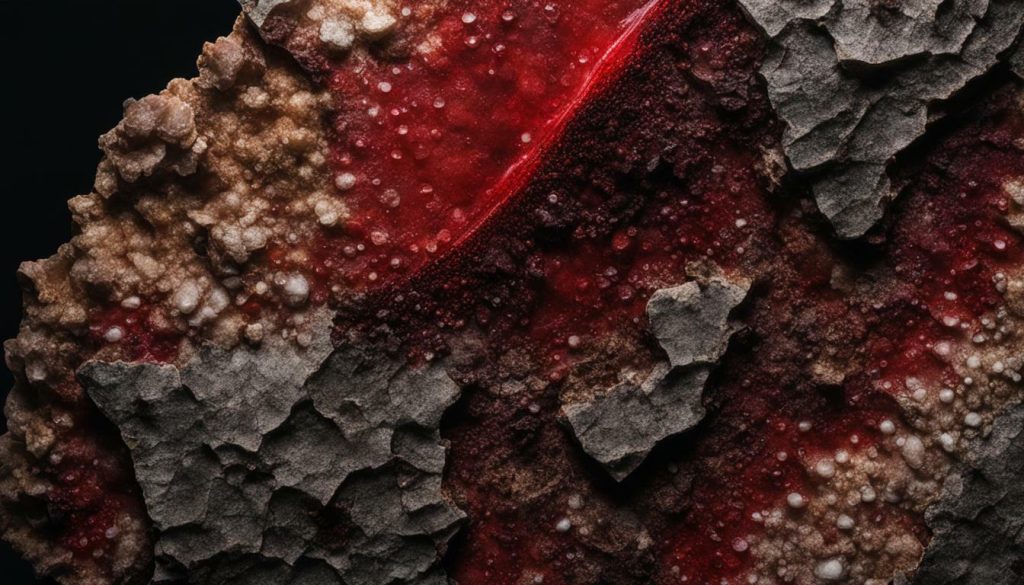
It is important to consult a healthcare provider if you suspect kidney stones as the cause of your painful urination. They may recommend various treatment options depending on the size and location of the stones. These options can include medications to help pass the stones naturally, shock wave lithotripsy to break up the stones, or surgical intervention to remove them.
| Treatment Options for Kidney Stones | Advantages | Disadvantages |
|---|---|---|
| Medication | – Natural passage of stones – Non-invasive |
– May take time to work – Side effects |
| Shock Wave Lithotripsy | – Non-invasive – High success rate |
– Possible complications – Multiple sessions may be required |
| Surgery | – Direct removal of stones – Immediate relief |
– Invasive procedure – Recovery time |
It is essential to discuss with your healthcare provider which treatment option is most suitable for you. They will consider factors such as the size and composition of the kidney stones, your overall health, and any underlying conditions you may have.
Painful Urination and Specific Conditions
Certain conditions like urethral strictures, diverticulitis, and bladder cancer can lead to painful urination, and recognizing these conditions is vital for timely intervention. Urethral strictures are narrowings or blockages in the urethra, the tube that carries urine from the bladder to outside the body. These strictures can be caused by inflammation, scar tissue, or trauma and can cause discomfort and difficulty with urination.
Diverticulitis is a condition where small pouches form in the lining of the colon and become infected or inflamed. In some cases, these diverticula can press against the urinary system, leading to painful urination. It is essential to address diverticulitis promptly to prevent further complications.
Bladder cancer occurs when abnormal cells grow in the bladder lining. This can cause a range of symptoms, including painful urination. It is crucial to recognize the signs of bladder cancer, such as blood in the urine, and seek medical attention for diagnosis and treatment.

These specific conditions require proper diagnosis and treatment from a healthcare provider. Timely intervention is essential to manage symptoms, prevent complications, and improve overall urinary health. If you experience painful urination or any other concerning symptoms, it is important to seek medical help for an accurate diagnosis and appropriate treatment plan.
Table 1: Overview of Painful Urination Causes
| Condition | Symptoms | Treatment |
|---|---|---|
| Urethral strictures | Discomfort during urination, decreased flow | Dilation, urethrotomy, or surgery |
| Diverticulitis | Painful urination, abdominal pain, constipation | Antibiotics, dietary changes, surgery if necessary |
| Bladder cancer | Painful urination, blood in urine, frequent urination | Surgery, chemotherapy, radiation therapy |
Recognizing the specific conditions causing painful urination is the first step towards effective treatment. With proper medical care and intervention, individuals can find relief from symptoms and improve their urinary health.
Painful Urination in Women
Women may experience pain during urination due to factors like vaginal inflammation, vaginal tears or cuts, and the use of certain personal care products. Vaginal inflammation, also known as vaginitis, can be caused by infections, such as yeast infections or bacterial vaginosis, as well as irritants like douches, perfumed soaps, or bubble baths. These irritants can disrupt the natural pH balance of the vagina, leading to inflammation and discomfort.
When the vaginal tissue is inflamed or irritated, urinating can exacerbate the pain and cause a burning sensation. In some cases, vaginal tears or cuts, which can occur during sexual intercourse, childbirth, or rough handling, can also contribute to painful urination. These tears can cause discomfort during urination as the urine comes into contact with the open wounds.
To avoid these issues, it’s important for women to practice good genital hygiene and avoid using harsh or perfumed products in the vaginal area. Instead, opt for gentle, unscented cleansers and avoid douching, as it can disrupt the natural balance of bacteria in the vagina.
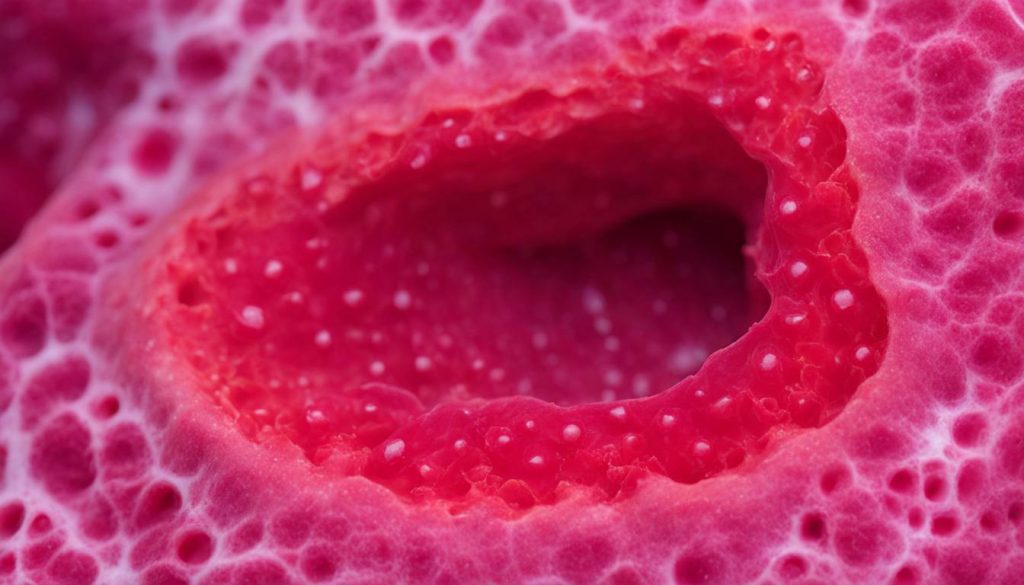
| Possible Causes of Painful Urination in Women: | Symptoms: |
|---|---|
| Vaginal inflammation (vaginitis) | – Itching or burning sensation – Abnormal vaginal discharge – Redness or swelling |
| Vaginal tears or cuts | – Pain or discomfort during urination – Bleeding or spotting |
| Use of certain personal care products | – Irritation or redness – Burning sensation during urination |
If you experience painful urination along with other concerning symptoms, such as blood in the urine, frequent urination, or fever, it is important to consult a healthcare provider for proper diagnosis and treatment. They can help determine the underlying cause of your discomfort and recommend appropriate remedies or treatment options.
Painful Urination and Pregnancy
Painful urination can sometimes occur during pregnancy due to hormonal changes and an increased risk of urinary tract infections (UTIs). The hormonal changes in the body can affect the urinary system, leading to discomfort and pain during urination. Additionally, pregnant women are more susceptible to UTIs, which can further contribute to painful urination. It is important for expectant mothers to be aware of these potential issues and seek medical advice if they experience any discomfort.
A UTI during pregnancy can not only cause pain during urination but can also lead to more serious complications if left untreated. UTIs can potentially affect the kidneys and increase the risk of preterm labor. Therefore, it is crucial for pregnant women to promptly address any symptoms of painful urination or other signs of a possible infection. A healthcare provider can provide proper diagnosis and recommend appropriate treatment options.
Managing UTIs during pregnancy may involve the use of antibiotics that are deemed safe for both the expectant mother and the developing baby. It is important to follow the prescribed course of antibiotics to effectively treat the infection. Additionally, healthcare providers may recommend lifestyle changes, such as increasing fluid intake and practicing good hygiene, to help prevent UTIs and alleviate discomfort during urination. These measures can help promote urinary tract health and overall well-being during pregnancy.
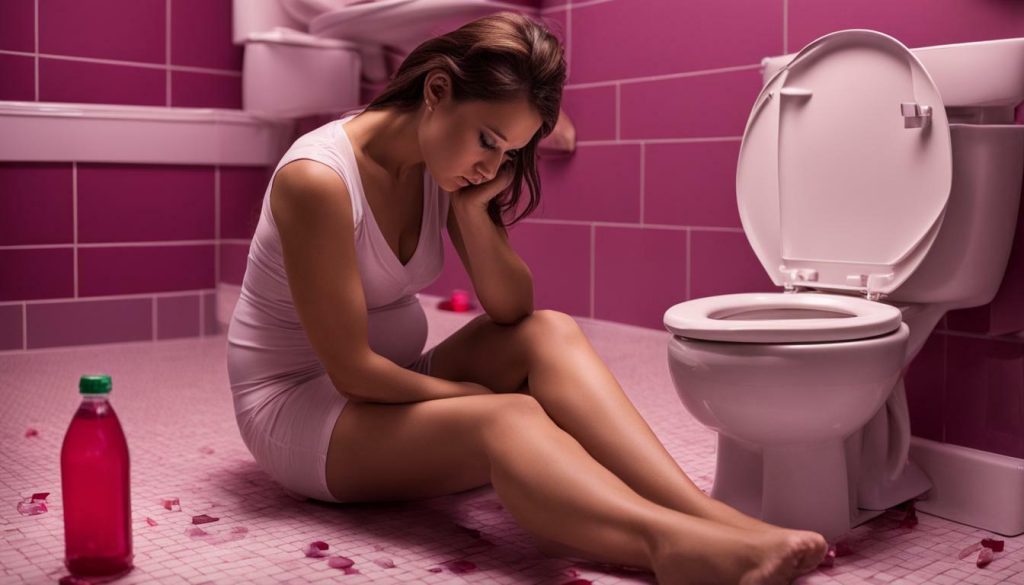
Irritants and Painful Urination
Factors like radiation therapy, chemotherapy, and the use of specific personal care products can irritate the urinary system and cause discomfort during urination. Radiation therapy, which is often used to treat cancer, can inadvertently affect the surrounding tissues, including the urinary system. This can cause inflammation and irritation, leading to pain or a burning sensation when passing urine.
Chemotherapy, another common treatment for cancer, can also have side effects on the urinary system. The chemicals used in chemotherapy can irritate the bladder, urethra, and kidneys, resulting in painful urination.
Additionally, certain personal care products such as soaps, bubble baths, and feminine hygiene sprays can contain harsh chemicals or fragrances that can irritate the delicate tissues of the urinary system. These irritants can disrupt the natural balance and lead to inflammation and discomfort during urination.
In order to alleviate the symptoms of painful urination caused by these irritants, it is important to avoid or minimize exposure to them. This may involve using gentle and fragrance-free personal care products, opting for mild soaps, and avoiding bubble baths. It is also advisable to discuss any ongoing medical treatments or concerns with a healthcare provider, who can provide guidance and suggest appropriate alternatives or remedies.
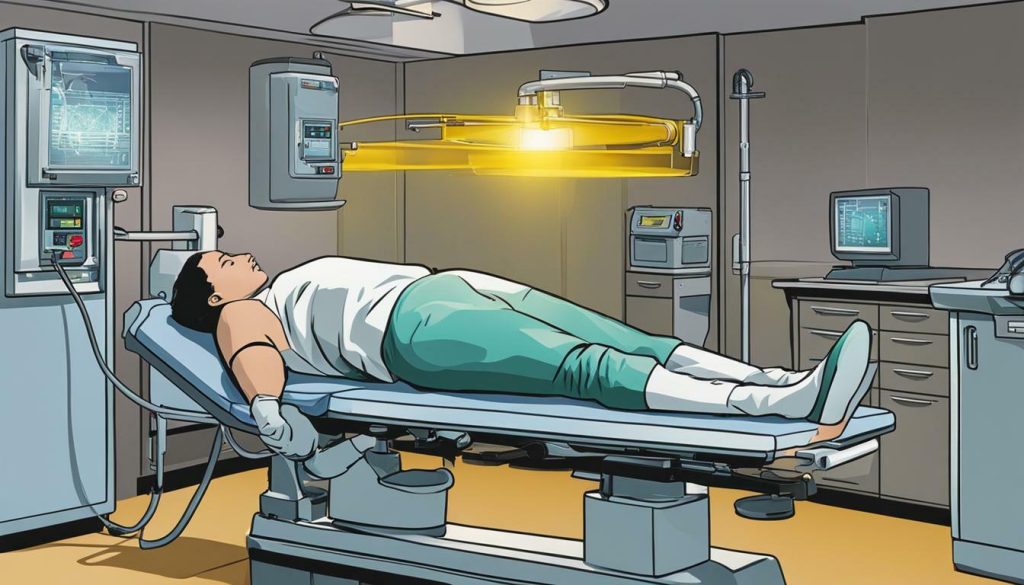
| Radiation Therapy and Painful Urination | Causes | Prevention |
|---|---|---|
| Factors: | Radiation therapy | Avoid urinary irritants |
| Symptoms: | Pain or burning during urination | Use gentle and fragrance-free products |
| Treatment: | Discuss with healthcare provider | Minimize exposure to irritants |
Seeking Medical Help and Treatment Options
If you’re experiencing painful urination, it’s crucial to consult a healthcare provider who can provide a proper diagnosis and recommend suitable treatment options. Painful urination can be a symptom of various underlying conditions, ranging from urinary tract infections to more serious issues like bladder cancer. Seeking medical help will ensure that you receive the appropriate care and alleviate your discomfort.
Upon visiting a healthcare provider, they will likely conduct a thorough evaluation, which may include a physical examination and laboratory tests to identify the cause of your pain. For example, if a urinary tract infection is suspected, a urine sample can be analyzed to check for the presence of bacteria.
Depending on the diagnosis, treatment options may vary. For bacterial infections like urinary tract infections, antibiotics are often prescribed to eliminate the infection-causing bacteria. It’s important to complete the full course of antibiotics as prescribed by your healthcare provider to ensure effective treatment.
| Treatment Options | Description |
|---|---|
| Pain Relief Medications | To alleviate the discomfort associated with painful urination, your healthcare provider may recommend over-the-counter pain relief medications, such as ibuprofen or acetaminophen. |
| Lifestyle Changes | In some cases, making changes to your daily habits and routines can help prevent or reduce the occurrence of painful urination. This may include drinking plenty of water, avoiding irritants like spicy foods and caffeine, and practicing good hygiene. |
| Surgery | In certain situations, such as when blockages or structural abnormalities are causing the pain, surgery may be necessary. Your healthcare provider will discuss this option with you and provide further guidance. |
Remember, every individual’s situation is unique, and the treatment plan recommended by your healthcare provider will be tailored to your specific needs. It’s important to follow their advice and continue any prescribed medications or treatments as directed. By doing so, you can find relief from painful urination and ensure your urinary health is effectively managed.
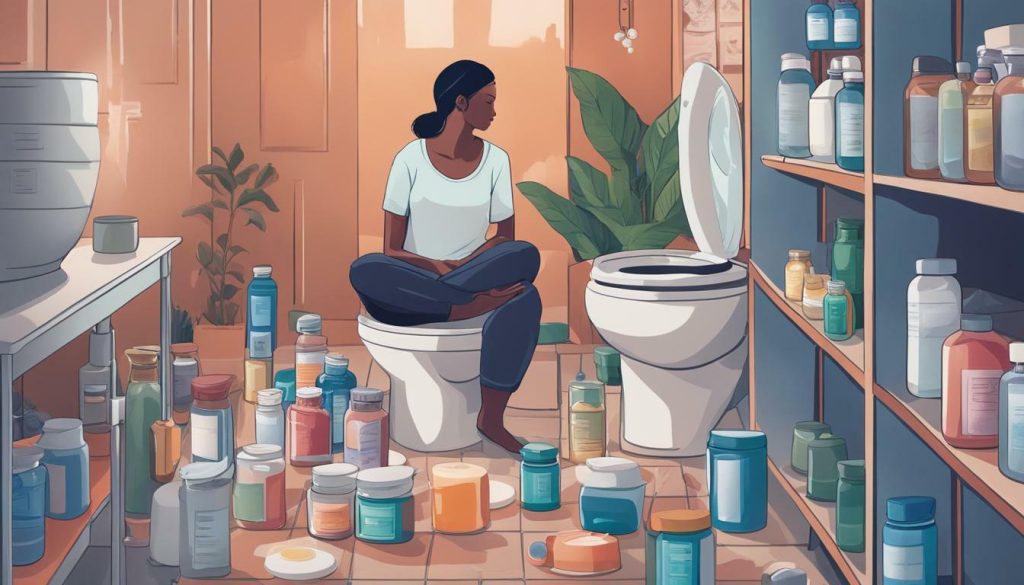
Making certain lifestyle changes can play a significant role in preventing painful urination and promoting overall urinary tract health. By incorporating these simple changes into your daily routine, you can minimize the risk of developing conditions that cause discomfort during urination. Here are some key lifestyle adjustments to consider:
- Stay hydrated: Drinking an adequate amount of water can help flush out bacteria and toxins from your urinary system, reducing the risk of infections.
- Maintain good hygiene: Practice proper genital hygiene, especially for women, to keep the urinary tract clean and prevent the entry of bacteria. Avoid using harsh soaps or douches that can disrupt the natural balance of the vaginal environment.
- Avoid holding urine: Urinate regularly and don’t hold in urine for prolonged periods. This helps prevent the multiplication of bacteria in the urinary tract.
- Urinate before and after sexual activity: Emptying your bladder before and after sexual intercourse helps eliminate any bacteria that may have entered the urinary tract during sexual activity.
- Practice safe sex: Using barrier methods such as condoms can reduce the risk of sexually transmitted infections that can lead to painful urination.
- Avoid irritating substances: Minimize your exposure to irritants like harsh chemicals, fragrances, or personal care products that may irritate the urinary tract. Opt for hypoallergenic and fragrance-free options whenever possible.
- Optimize your diet: Consuming a balanced diet rich in fruits, vegetables, and whole grains can help support a healthy immune system and maintain urinary tract health.
- Manage stress: Chronic stress can weaken the immune system, making you more susceptible to infections. Incorporate stress management techniques such as exercise, meditation, or deep breathing into your daily routine.
Summary:
Making lifestyle changes can be an effective way to prevent painful urination and maintain a healthy urinary tract. By adopting good hygiene practices, staying hydrated, practicing safe sex, avoiding irritants, and managing stress, you can significantly reduce the risk of developing conditions that cause discomfort during urination.

| Food | Potential Benefits |
|---|---|
| Cranberries | Contain compounds that may help prevent urinary tract infections. |
| Blueberries | Rich in antioxidants that support overall urinary tract health. |
| Watermelon | High water content promotes hydration and supports urine production. |
| Leafy greens | Provide essential vitamins and minerals that support a healthy immune system. |
| Broccoli | Contains compounds that may help reduce the risk of bladder cancer. |
| Yogurt | Probiotics in yogurt help maintain a healthy balance of bacteria in the urinary tract. |
Conclusion
Painful urination can be caused by various factors, and seeking appropriate medical help is crucial for proper diagnosis and treatment to find relief. It is a common issue that can affect anyone regardless of age or gender, although it is more prevalent in women. The most frequent cause of painful urination is a urinary tract infection (UTI), which occurs when bacteria enter the urethra and infect the urinary system.
Other common causes include sexually transmitted infections (STIs), chemical sensitivity, kidney stones, bladder stones, urethral stricture, diverticulitis, surgery or medical treatments, medications, and bladder cancer. Pregnant women may also experience painful urination due to hormonal changes and UTIs. Women may also experience pain during urination due to vaginal inflammation, tears or cuts, and douching.
In some cases, painful urination can be triggered by irritants like radiation therapy, chemotherapy, and certain personal care products. It is important to consult a healthcare provider for a proper diagnosis and treatment. They may prescribe antibiotics, antiviral medications, pain relief medications, hormone therapy, or recommend surgery. Lifestyle changes such as maintaining good hygiene, staying hydrated, and practicing safe sex can also help prevent painful urination.
If you experience painful urination, do not ignore it. Seeking medical help is essential to address the underlying cause and find relief. It is important to remember that everyone’s situation is unique, and a healthcare provider will be able to provide personalized guidance and treatment options based on your specific needs.
FAQ
What are the common causes of painful urination?
The common causes of painful urination include urinary tract infections, sexually transmitted infections, kidney stones, bladder stones, urethral stricture, diverticulitis, and bladder cancer.
Can pregnancy cause painful urination?
Yes, hormonal changes during pregnancy can contribute to painful urination, along with the increased risk of urinary tract infections.
Can vaginal inflammation or douching cause pain during urination in women?
Yes, vaginal inflammation, vaginal tears or cuts, and douching can all cause pain during urination in women.
Are there any irritants that can lead to painful urination?
Yes, irritants such as radiation therapy, chemotherapy, and certain personal care products can irritate the urinary system and cause painful urination.
When should I see a healthcare provider for painful urination?
It is important to see a healthcare provider for a proper diagnosis and treatment if you experience painful urination.
What are the common treatment options for painful urination?
Treatment options may include antibiotics, antiviral medications, pain relief medications, hormone therapy, surgery, or lifestyle changes.
How can I prevent painful urination?
Lifestyle changes, such as staying hydrated, maintaining good hygiene, and avoiding irritants, can help prevent painful urination.




